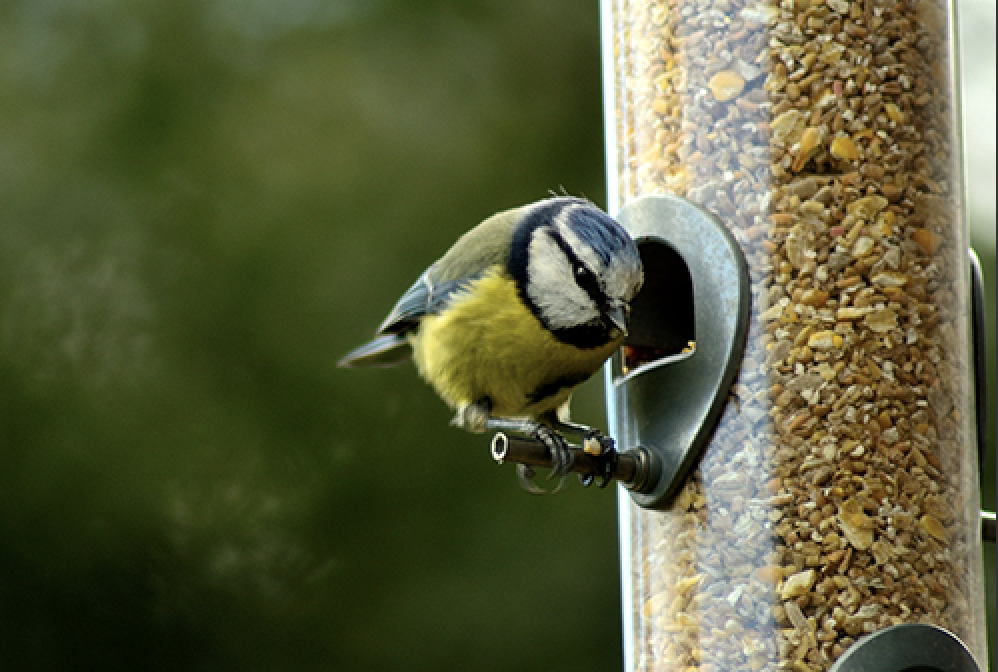Clean Feeders, Healthy Birds
Apr 25, 2022

Don't let your backyard birds eat off a dirty plate. Responsible bird feeding involves more than just setting up a bird feeder in your yard — it involves routine maintenance to keep the feeders clean.
What causes a dirty feeder?
It doesn't take long for wildlife and weather to contribute to a dirty feeder. Bird seed hulls are quick to accumulate and can clog up the feeding ports, making it hard for birds to reach the fresh seed. Droppings, whether it be from birds or other unwelcome visitors such as mice, carry germs and bacteria that are harmful if consumed, and parasites left behind can be easily spread to other wildlife. Outdoor elements such as wind and rain can also carry dirt and debris into bird feeders, while sunlight may cause old bird seed to mold or mildew.
Does a dirty feeder make birds sick?
Birds are fragile animals, and disease spreads quickly through avian populations. Entire bird colonies have been wiped out due to a sickness that started from a single bird. Migratory flocks, especially, can become “super spreaders” of disease because of how many different feeders they visit on their route. Diseases such as avian pox, conjunctivitis, salmonellosis, and trichomoniasis have been historically linked to congregations at bird feeders. Some symptoms of these diseases include lethargy, swollen eyelids, diarrhea, skin lesions, anorexia, and respiratory infection. Additionally, mold and mildew are some of the biggest contributors to fatal respiratory issues in birds, as well as skin irritation when rubbed against.
How do you clean a dirty feeder?
Cleaning a bird feeder is not rocket science, but it does involve some time and elbow grease. Avoid using toxic products such as ammonia and non-diluted bleach that are fatal to wildlife and cause damage to your feeder. Carefully disassemble the feeder and clean the ports with water, wildlife-safe soap, and a soft cloth, using a toothbrush to get dirt out of tight crevices. Always wear gloves when cleaning to avoid encountering bacteria or parasites and wash your hands once you are done. If the feed ports are small, you can wash them in the dishwasher with a diluted bleach solution. Always ensure that the bird feeder is completely dry before refilling with seed to prevent mold or mildew.
It is recommended to clean your bird feeders weekly to keep them sanitary for your feathered visitors. After all, it is our responsibility to wildlife to eliminate conditions that could contribute to the spread of disease by providing safe, clean feeding stations. To start fresh with a new bird feeder and seed, visit your local Co-op.
For more content like this, check out the latest issue of the Cooperator.
What causes a dirty feeder?
It doesn't take long for wildlife and weather to contribute to a dirty feeder. Bird seed hulls are quick to accumulate and can clog up the feeding ports, making it hard for birds to reach the fresh seed. Droppings, whether it be from birds or other unwelcome visitors such as mice, carry germs and bacteria that are harmful if consumed, and parasites left behind can be easily spread to other wildlife. Outdoor elements such as wind and rain can also carry dirt and debris into bird feeders, while sunlight may cause old bird seed to mold or mildew.
Does a dirty feeder make birds sick?
Birds are fragile animals, and disease spreads quickly through avian populations. Entire bird colonies have been wiped out due to a sickness that started from a single bird. Migratory flocks, especially, can become “super spreaders” of disease because of how many different feeders they visit on their route. Diseases such as avian pox, conjunctivitis, salmonellosis, and trichomoniasis have been historically linked to congregations at bird feeders. Some symptoms of these diseases include lethargy, swollen eyelids, diarrhea, skin lesions, anorexia, and respiratory infection. Additionally, mold and mildew are some of the biggest contributors to fatal respiratory issues in birds, as well as skin irritation when rubbed against.
How do you clean a dirty feeder?
Cleaning a bird feeder is not rocket science, but it does involve some time and elbow grease. Avoid using toxic products such as ammonia and non-diluted bleach that are fatal to wildlife and cause damage to your feeder. Carefully disassemble the feeder and clean the ports with water, wildlife-safe soap, and a soft cloth, using a toothbrush to get dirt out of tight crevices. Always wear gloves when cleaning to avoid encountering bacteria or parasites and wash your hands once you are done. If the feed ports are small, you can wash them in the dishwasher with a diluted bleach solution. Always ensure that the bird feeder is completely dry before refilling with seed to prevent mold or mildew.
It is recommended to clean your bird feeders weekly to keep them sanitary for your feathered visitors. After all, it is our responsibility to wildlife to eliminate conditions that could contribute to the spread of disease by providing safe, clean feeding stations. To start fresh with a new bird feeder and seed, visit your local Co-op.
For more content like this, check out the latest issue of the Cooperator.